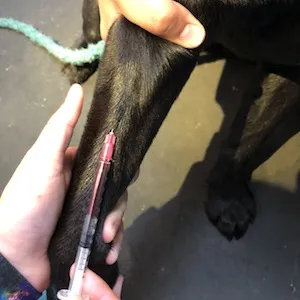Heartworm disease is a severe and potentially fatal condition affecting dogs across the United States and many other parts of the world. Caused by foot-long worms residing in the heart, lungs, and associated blood vessels, it leads to critical lung disease, heart failure, and damage to various organs. Small dogs, due to their size, can be particularly vulnerable, as even a moderate number of worms can have a more pronounced impact on their smaller systems. Understanding the disease and implementing effective Heartworm Medicine For Small Dogs is crucial for their long-term health and well-being. This guide will walk you through everything you need to know about protecting your beloved small canine companion.
What is Heartworm Disease and Why are Small Dogs at Risk?
Heartworm disease is caused by Dirofilaria immitis, a parasitic worm that primarily affects canines. Dogs are natural hosts, meaning heartworms can mature into adults, mate, and produce offspring within their bodies. If left untreated, the number of worms can escalate significantly, potentially reaching several hundred, causing lasting damage to the heart, lungs, and arteries. The disease also impacts other organs, leading to a diminished quality of life.
While all dogs are susceptible, the impact on smaller breeds can be particularly devastating. A smaller heart and lung capacity mean that fewer worms can cause more severe obstruction and clinical signs sooner than in a larger dog. This highlights the critical importance of effective heartworm meds for dogs, especially tailored for smaller breeds, to prevent this debilitating illness.
 Heartworms can severely damage a dog's heart and lungs
Heartworms can severely damage a dog's heart and lungs
How Heartworm Disease is Transmitted
The transmission of heartworm disease relies entirely on the mosquito. Adult female heartworms living in an infected animal (such as a dog, fox, coyote, or wolf) produce microscopic offspring called microfilariae, which circulate in the bloodstream. When a mosquito bites an infected animal, it ingests these microfilariae. Inside the mosquito, the microfilariae develop into “infective stage” larvae over 10 to 14 days.
When this infected mosquito bites another dog, the infective larvae are deposited onto the animal’s skin surface and enter the new host through the bite wound. Once inside, it takes approximately six months for the larvae to mature into sexually active adult heartworms. These adult worms can live for 5 to 7 years in dogs. Given the longevity of the worms, each mosquito season can lead to an accumulation of heartworms in an unprotected pet, making year-round prevention vital.
Recognizing the Signs of Heartworm Disease in Dogs
In the early stages of heartworm disease, many dogs, including small breeds, show few to no symptoms. Symptoms become more apparent as the infection progresses and the worm burden increases. Active dogs, those with heavy infections, or those with existing health issues often display more pronounced clinical signs.
Common signs of heartworm disease can include a mild, persistent cough, reluctance to exercise, fatigue after moderate activity, decreased appetite, and weight loss. As the disease advances, dogs may develop heart failure, characterized by a swollen belly due due to excess fluid accumulation. In severe cases, a life-threatening condition called caval syndrome can occur, caused by a sudden blockage of blood flow within the heart. This is marked by rapid onset of labored breathing, pale gums, and dark, bloody, or coffee-colored urine. Without immediate surgical intervention to remove the blockage, the prognosis for dogs with caval syndrome is poor.
The Significance of Heartworm Testing
Heartworm disease is a serious and progressive condition. The earlier it is detected, the better the chances for successful treatment and recovery. Because early signs are often subtle or absent, regular heartworm testing administered by a veterinarian is crucial for all dogs, including small dogs. This test typically requires only a small blood sample from your pet and detects the presence of heartworm proteins.
Veterinarians can process these tests in-house or send samples to a diagnostic laboratory, with results usually available quickly. If your dog tests positive, your veterinarian will likely recommend further diagnostic tests to assess the severity of the infection and overall health of your pet. The American Heartworm Society recommends annual testing for all dogs to ensure the effectiveness of prevention programs and early detection of any breakthrough infections.
 Veterinarian collecting a blood sample from a dog for heartworm testing
Veterinarian collecting a blood sample from a dog for heartworm testing
Heartworm Medicine for Small Dogs: Prevention is Key
Preventing heartworm disease is significantly safer, easier, and more affordable than treating an established infection. For small dogs, the American Heartworm Society recommends continuous, year-round prevention.
Types of Heartworm Preventatives: Heartworm medicine for small dogs comes in several forms:
- Oral Medications: Often flavored chewable tablets given monthly. These are a popular choice for many small dog owners due to ease of administration.
- Topical Medications: Liquid applied to the skin (usually between the shoulder blades) monthly. These can be beneficial for small dogs that are difficult to pill.
- Injectable Medications: Administered by a veterinarian, providing protection for 6 or 12 months. This is an excellent option for owners who may forget monthly doses, ensuring consistent protection for their small dog.
All approved heartworm medications work by eliminating the immature (larval) stages of the heartworm parasite that were transmitted by mosquitoes in the previous 30-45 days. This means that if an infected mosquito bites your dog, the preventive medication kills the developing larvae before they can mature into adult worms that cause disease. It’s crucial to administer these medications strictly on schedule, as even a slightly delayed dose can allow larvae to molt into a stage that preventives cannot effectively eliminate. Many heartworm preventives also offer protection against other common parasites, such as hookworms, roundworms, whipworms, and even external parasites like fleas and ticks. Consulting with your veterinarian will help you determine the best dog wormer flea and tick treatment that combines heartworm protection with other parasite control suited for your small dog’s needs.
Starting Heartworm Prevention in Small Dogs
Puppies, including small breed puppies, are just as susceptible to heartworm disease as adult dogs. The American Heartworm Society recommends starting puppies on a heartworm preventive as early as the product label allows, typically no later than 8 weeks of age.
The dosage of heartworm medicine for small dogs is based on body weight, not age. Small breed puppies can grow rapidly in their first months, and their weight may quickly shift them from one dosage range to the next. It’s essential to have your small dog weighed at every veterinary visit to ensure they are receiving the correct dosage. If you anticipate a dosage change due to growth, you might consider purchasing only one or two doses at a time. Your veterinarian will provide guidance on when a dosage adjustment will be needed to maintain effective protection.
What to Do if Your Small Dog Tests Positive for Heartworms
Receiving a positive heartworm diagnosis can be concerning, but the good news is that most infected dogs can be successfully treated. The primary goals of treatment are to stabilize your dog’s condition, eliminate all adult and immature worms, and minimize treatment-related side effects.
If your small dog tests positive, here’s what to expect:
- Confirm the Diagnosis: Given the expense and complexity of heartworm treatment, your veterinarian will likely confirm a positive antigen test with an additional, different test to ensure accuracy.
- Restrict Exercise: This is perhaps the most critical component of treatment. Physical exertion increases the rate at which heartworms cause damage to the heart and lungs. Your small dog’s activity must be severely restricted as soon as the diagnosis is confirmed, often requiring strict crate rest.
- Stabilize Your Dog’s Health: Before initiating the main heartworm treatment, your dog’s condition may need to be stabilized with appropriate therapies, especially in severe cases or if other health issues are present. This stabilization period can take several months.
- Administer Treatment: The only FDA-approved drug for treating heartworm infection in dogs is melarsomine, administered via injection by a veterinarian. The American Heartworm Society provides guidelines for a comprehensive treatment protocol, which often includes several other medications to improve success rates and reduce side effects. This typically involves administering a heartworm preventive medication for two months prior to melarsomine treatment to prevent new infections and eliminate young worms.
- Post-Treatment Testing and Prevention: Approximately nine months after treatment completion, your veterinarian will perform a heartworm test to confirm that all heartworms have been eliminated. To prevent re-infection, your small dog should remain on year-round heartworm prevention for the rest of their life.
 A dog resting in a kennel during heartworm treatment recovery
A dog resting in a kennel during heartworm treatment recovery
Important Considerations for Heartworm Prevention
Prescription Requirement
Yes, heartworm preventives require a prescription from a licensed veterinarian. The U.S. Food and Drug Administration (FDA) mandates this because giving preventives to a dog already infected with adult heartworms can lead to rare but potentially severe or even fatal reactions. Your veterinarian will perform a heartworm test to ensure your small dog is heartworm-free before prescribing medication. This also provides an opportunity to discuss comprehensive parasite control, including cheap flea medicine for dogs or best tick removal medicine for dogs if needed.
Missed Doses
If you miss two months of heartworm prevention for your small dog, contact your veterinarian immediately. They will advise you to restart the monthly preventive and will recommend retesting your dog six months later. This retesting is crucial because heartworms must be approximately seven months old before they can be detected by diagnostic tests.
Year-Round Prevention
Even in colder climates or arid regions with seemingly few mosquitoes, year-round heartworm prevention is recommended by the American Heartworm Society. Mosquito species are adaptable, and some can overwinter indoors. Additionally, factors like climate variations, presence of wildlife carriers (coyotes, foxes), and travel with your pet mean that the risk of infection can vary unpredictably. Year-round prevention offers the safest and most consistent protection for your small dog.
No Natural Prevention or Vaccine
Currently, there is no commercially available vaccine for heartworm disease. Furthermore, only heartworm prevention products tested and proven effective by the U.S. Food and Drug Administration (FDA) should be used. There are no effective natural preventatives that meet these standards.
Overall Health and Age
A dog’s age is one factor influencing the success of heartworm treatment. Older dogs with long-term infections may have significant damage to their organs, which can complicate treatment. Regardless of age, strict adherence to your veterinarian’s instructions, especially regarding exercise restriction during treatment, is paramount for the best chance of success. Regular veterinary check-ups are also crucial for managing your small dog’s overall health, including addressing any other conditions that might arise, such as those that might require pyometra antibiotics in female dogs.
Conclusion
Heartworm disease is a serious threat to dogs, but with consistent prevention, it is entirely avoidable. For small dogs, whose smaller bodies can be more significantly impacted by this parasite, year-round heartworm medicine is not just a recommendation but a vital component of their health care. Regular veterinary visits, timely testing, and strict adherence to your chosen preventive medication regimen are the cornerstones of protecting your beloved companion from this debilitating disease. Always consult your veterinarian to determine the most appropriate heartworm prevention strategy for your small dog, ensuring they live a long, healthy, and heartworm-free life.
